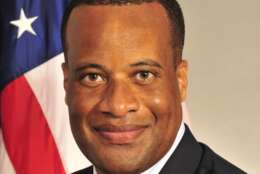SDFM The Business of Defense
This program will provide a progress report on cybersecurity in government.
January 25, 2016Tune in to FEDtalk this week as host Jason Briefel talks to the VETS Deputy Assistant Secretary for Policy, Teresa W. Gerton, and the U.S. Small Business Administration's Associate Administrator for the Office of Veterans Business Development, Barb Carson. January 22, 2016
January 22, 2016On this edition of “Disaster Relief for America”, hosts Tim Karney and Tom Moran interview Mike Ambrosio, the Vice President of Quality Assurance at Wakefern Food Corporation.
January 19, 2016-
In today's on-the-go lifestyle, a majority of people are turning to their mobile devices for all kinds of information. Not only are we using smartphones and tablets for phone calls and texts, but also checking email, using social media, watching videos, listening to music and Internet use. This isn’t limited to just non-government employees, either. Even though feds may have restrictions on what they can access, mobile device usage is up from 80 percent in 2014 to 90 percent in 2015.
January 19, 2016 -
The Economic Development Administration has celebrated 50 years in business. Federal Drive with Tom Temin had an exclusive interview with Assistant Commerce Secretary Jay Williams.
January 19, 2016 What are the strategic priorities for DHS’ Science and Technology Directorate? What is the purpose of the national conversation on Homeland Security technology? How is DHS building strong and healthy leadership culture within its S&T directorate? Join host Michael Keegan as he explores these questions and more with Dr. Reggie Brothers, Under Secretary for Science and Technology, U.S. Department of Homeland Security.
January 18, 2016Resources from ViON pertaining to cloud.
January 15, 2016What happens when you bring together some of the nation’s leading hackers, the Pentagon’s chief of training and an Air Force Academy professor who teaches cyber skills to cadets? They all agree on one thing: The government’s approach to cyber security is coming up short.
January 15, 2016-
Facebook is the most widely used social media platform around the globe but is excluded from many marketing plans. This is not without good reason, though. Facebook is a personal network and most people only use it for personal reasons, unlike LinkedIn and to some degree Twitter. Facebook may not be seen as a marketing tool because users may be reluctant to bring businesses into their personal lives. In addition, some agencies and business have even blocked Facebook to their employees. Federal workers can be limited in social media activities, such as expressing political views, and may avoid Facebook completely. However, Facebook usage by government employees continues to be on the rise so this may be a powerful untapped resource.
January 13, 2016 On this edition of “Disaster Relief for America”, hosts Tim Karney and Tom Moran interview Eric Epley, the Executive Director of the Southwest Texas Regional Advisory Council for Trauma.
January 12, 2016-
The main population count not only takes place every 10 years, it also requires 10 years of planning. For 2020, that job falls to Lisa Blumerman, director of the 2020 count at the Census Bureau. As you might have guessed, the bureau is deep into preparing for 2020. Federal Drive with Tom Temin asked Blumerman on Agency of the Month for a status update and a sense of the scope of the mission for which she's responsible.
January 12, 2016 What is open innovation and how can government leaders use it to find new ways to improve services? What are the best ways to capitalize on open innovation? Join host Michael Keegan and he explores these questions and more with Donald Wynn and Renee Pratt, authors of Making Open Innovation Ecosystems Work: Case Studies in Healthcare.
January 11, 2016Host Jason Briefel will be joined by a panel of guests representing federal employee organizations, including National Active and Retired Federal Employees Association (NARFE) Legislative Director Jessica Klement and Deputy Legislative Director John Hatton, and Professional Managers Association (PMA) Washington Representative Nikki Cannon, who will join the program to discuss their predictions for 2016 and provide a look-back on 2015. January 8, 2016.
January 08, 2016The ViON Flash eBook offers three compelling reasons why you should consider making the switch now: ease of use, performance and affordability.
January 08, 2016-
Thought leadership is a type of content marketing that uses the expertise of people in your organization to solve the biggest problems that face your target audience. When done correctly, thought leadership will position your organization as the leading expert in your business category. It will also create respect and recognition, improve relationships with clients and the community and ultimately improve marketing and revenue-related goals. In this way, thought leadership can be as important to the brand as the product or service that it sells. Follow these seven steps to assure that your thought leaders have the most impact on your audience.
January 07, 2016





